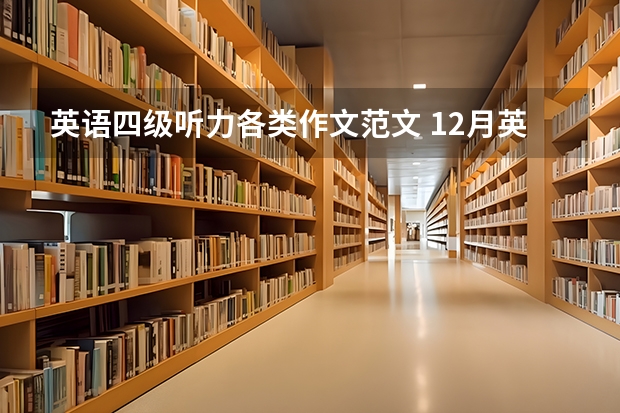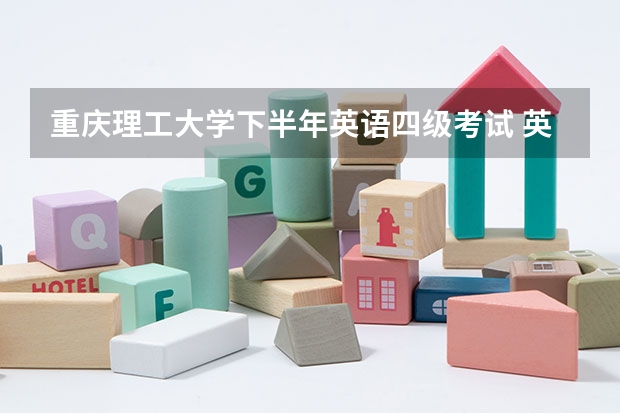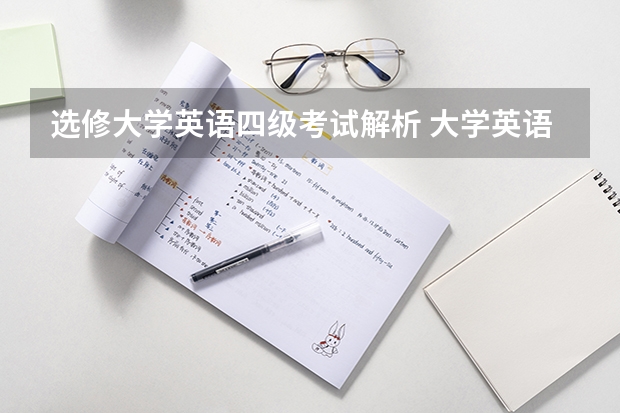英语四级听力各类作文范文 12月英语四级听力真题短文(三篇)
2024-11-05 04:09:30 | 金大话英语培训网
本文目录一览:

2014年12月英语四级听力真题短文(三篇)
2014年12月英语四级已经结束,接下来带大家回顾本次听力真题,同时为大家提供2014年12月英语四级听力真题及答案,供大家参考!
Passage 1
Scientists know how twins were born, now though, they are trying to explain how being half of the biological pair influences a twin’s identity. They want to know why many identical twins make similar choices even when they don’t leave near each other. For example, Jim Springer and Jim Louis are identical twins. They were separatedwhen they were only 4 months old. The two Jims grew up in different families and did not meet for 39 years. When they finally met, they discovered some surprising similarities between them. Both men were married twice, their first wives were named Linda, and their second wives were both named Betty. Both twins named their first sons James Allen. Scientists want to know what influences are personality. They study pairs of identical twins who grew up in different surroundings, like Jim Springer and Jim Louis. These twins help scientists understand the connection between environment and biology. Researchers at the University of Minnesota, studies 350 sets of identical twins who did not grow up together. They discovered many similarities in their personalities. Scientists believed that personality characteristics such as friendliness, shyness and fears are not result of environment. These characteristics are probably inherited. Scientists continue to study identical twins because they are uncertain about them and have many questions. For example, they want to know ‘can twins really communicate without speaking’, ‘can one twin really feel another twin’s pain’. Perhaps with more research, scientists will find the answers.
16. What are scientists trying to explain according to the passage?
17. What do we learn about the twin Jims?
18. Why are scientists interested in studying identical twins raised in different families?
Passage 2
Today I’m going to talk about tents. Camping is still one of the cheapest ways of having a holiday. And each year, over 3 million people take camping vocations, either here in Britain or aboard, mostly on the continent. Obviously, camping can’t be as comfortable as living in a permanent house, but modern tents can be very comfortable indeed, with windows, bedrooms, kitchens and sitting rooms. The most popular tent sold in Britain is the frame tent with 2 bedrooms and sleeping accommodation for 4 people. There is usually an outer tent of water-proofed fabric and a lighter inner tent or tents with a built-in ground sheet. The outer tent fits over the frame work. This is made of metal poles which are fitted together. The inner tent is attached to this frame. Generally, the inner tent is about half the area of the outer tent. The other half of the outer tent is the living area. This doesn’t usually have a ground sheet but you can buy one to fit, though it costs extra. The ordinary 4 bed frame tent doesn’t usually have a separate kitchen area, but the larger ones often do. You can buy a kitchen extension for many tents, and it’s worth buying one if you plan to stay camping in one place for more than a few days.
19. What does the speaker say about camping? 金大话英语培训网
20. What does the passage tell us about the most popular tent sold in Britain?
21. What does the speaker suggest buying if you plan to stay camping in one place for more than a few days?
Passage 3
Andorra, one of the smallest countries in the world, is located high in the mountains between France and Spain. The country covers only 179 square miles. That is less than half the size of New York City. High, rocky mountains surround Andorra. Until the 1930s, travelers had difficulty in reaching the country. Up until that time, people in Andorra lived in the way they had lived for centuries. Most Andorrans worked as farmers. Things did not change quickly. When roads were built from France and Spain to Andorra in the 1930s, life picked up speed. Tourist began to visit the small country. These tourists brought in a lot of money to spend while visiting. Many people in Andorra found new jobs in shops or hotels. These changes helped to keep young people in Andorra. There were many more jobs than before the roads were built. Today tourists provided 80 to 90 percent of Andorra’s income. More than a million people visit each year. They come to view the rough mountains. They enjoy the quiet way of life. Most people are also interested in the ancient buildings. There are many shops for tourists to browse in, clothes, watches, wines and other items are sold at low prices in Andorra. Import fees are low, so tourists enjoy the inexpensive shopping. Most of the businesses in Andorra are owned by its citizens. There are not many foreign businesses. Some Andorrans still farm and raise sheep and cattle. But most are now involved with the tourist trade.
22. How big does the speaker say Andorra is?
23. What can be said about Andorra before the 1930s?
24. What event changed the situation in Andorra?
25. What do most people do in Andorra do nowadays?
请大家密切关注本站( Ctrl+D )即可收藏了解最细英语四级考试动态!
为您推荐:

~~~~~英语四级听力材料~~~~
大学英语四级考试试点考试样卷(听力文字稿)Tape Script of Listening Comprehension
Section A
Directions: In this section, you will hear 8 short conversations and 2 long conversations. At the end of each conversation, one or more questions will be asked about what was said. Both the conversation and the questions will be spoken only once. After each question there will be a pause. During the pause, you must read the four choices marked A), B), C) and D), and decide which is the best answer. Then mark the corresponding letter on Answer Sheet 2 with a single line through the centre.
11. W: Simon, could you return the tools I lent you for building the bookshelf last month?
M: Uh, well, I hate to tell you this … but I can't seem to find them.
Q: What do we learn from the conversation?
12. W: I'm going to Martha's house. I have a paper to complete, and I need to use her computer.
M: Why don't you buy one yourself? Think how much time you could save.
Q: What does the man suggest the woman do?
13. W: Bob said that Seattle is a great place for conferences.
M: He's certainly in a position to make that comment. He's been there so often.
Q: What does the man say about Bob?
14. W: Mr. Watson, I wonder whether it's possible for me to take a vacation early next month .
M: Did you fill out a request form?
Q: What is the probable relationship between the two speakers?
15. M: Do you want to go to the lecture this weekend? I hear the guy who's going to deliver the lecture spent a year living in the rain forest.
W: Great! I'm doing a report on the rain forest. Maybe I can get some new information to add to it.
Q: What does the woman mean?
16. W: Wow! I do like this campus: all the big trees, the green lawns, and the old buildings with tall columns . It's really beautiful.
M: It sure is. The architecture of these buildings is in the Greek style. It was popular in the eighteenth century here.
Q: What are the speakers talking about?
17. M: This article is nothing but advertising for housing developers. I don't think the houses for sale are half that good.
W: Come on, David. Why so negative? We're thinking of buying a home, aren't we? Just a trip to look at the place won't cost us much.
Q: What can be inferred from the conversation?
18. M: Would you pass me the sports section, please?
W: Sure, if you give me the classified ads and local news section.
Q: What are the speakers doing?
Now you'll hear two long conversations.
Conversation One
W: Hello, Gary. How're you?
M: Fine! And yourself?
W: Can't complain. Did you have time to look at my proposal?
M: No, not really. Can we go over it now?
W: Sure. I've been trying to come up with some new production and advertising strategies. First of all, if we want to stay competitive, we need to modernize our factory. New equipment should've been installed long ago.
M: How much will that cost?
W: We have several options ranging from one hundred thousand dollars all the way up to half a million.
M: OK. We'll have to discuss these costs with finance.
W: We should also consider human resources. I've been talking to personnel as well as our staff at the factory.
M: And what's the picture?
W: We'll probably have to hire a couple of engineers to help us modernize the factory.
M: What about advertising?
W: Marketing has some interesting ideas for television commercials.
M: TV? Isn't that a bit too expensive for us? What's wrong with advertising in the papers, as usual?
W: Quite frankly, it's just not enough anymore. We need to be more aggressive in order to keep ahead of our competitors.
M: Will we be able to afford all this?
W: I'll look into it, but I think higher costs will be justified. These investments will result in higher profits for our company.
M: We'll have to look at the figures more closely. Have finance draw up a budget for these investments.
W: All right. I'll see to it.
Questions 19 to 22 are based on the conversation you have just heard.
• What are the two speakers talking about?
• What does the woman say about the equipment of their factory?
• What does the woman suggest about human resources?
• Why does the woman suggest advertising on TV?
Conversation Two
W: Sir, you've been using the online catalogue for quite a while. Is there anything I can do to help you?
M: Well, I've got to write a paper about Hollywood in the 30s and 40s, and I'm really struggling. There are hundreds of books, and I just don't know where to begin.
W: Your topic sounds pretty big. Why don't you narrow it down to something like … uh … the history of the studios during that time?
M: You know, I was thinking about doing that, but more than 30 books came up when I typed in “movie studios.”
W: You could cut that down even further by listing the specific years you want. Try adding “1930s” or “1940s” or maybe “Golden Age.”
M: “Golden Age” is a good idea. Let me type that in …. Hey, look, just 6 books this time. That's a lot better.
W: Oh … another thing you might consider … have you tried looking for any magazine or newspaper articles?
M: No, I've only been searching for books.
W: Well, you can look up magazine articles in the Reader's Guide to Periodical Literature . And we do have the Los Angeles Times available over there. You might go through their indexes to see if there's anything you want.
M: Okay. I think I'll get started with these books and then I'll go over the magazines.
W: If you need any help, I'll be over at the Reference Desk.
M: Great, thanks a lot.
Questions 23 to 25 are based on the conversation you have just heard.
• What is the man doing?
• What does the librarian think of the topic the man is working on?
• Where can the man find the relevant magazine articles?
Section B
Directions: In this section, you will hear 3 short passages. At the end of each passage, you will hear some questions. Both the passage and the questions will be spoken only once. After you hear a question, you must choose the best answer from the four choices marked A), B), C) and D). Then mark the corresponding letter on Answer Sheet 2 with a single line through the centre.
Passage One
In the next few decades people are going to travel very differently from the way they do today. Everyone is going to drive electrically powered cars. So in a few years people won't worry about running out of gas.
Some of the large automobile companies are really moving ahead with this new technology. F & C Motors, a major auto company, for example, is holding a press conference next week. At the press conference the company will present its new, electronically operated models.
Transportation in the future won't be limited to the ground. Many people predict that traffic will quickly move to the sky. In the coming years, instead of radio reports about road conditions and highway traffic, news reports will talk about traffic jams in the sky.
But the sky isn't the limit. In the future, you'll probably even be able to take a trip to the moon. Instead of listening to regular airplane announcements, you'll hear someone say, “The spacecraft to the moon leaves in ten minutes. Please check your equipment. And remember, no more than ten ounces of carry-on baggage are allowed.”
Questions 26 to 28 are based on the passage you have just heard.
• What will be used to power cars in the next few decades?
• What will future news reports focus on when talking about transportation?
• What is the special requirement for passengers traveling to the moon?
Passage Two
The period of engagement is the time between the marriage proposal and the wedding ceremony. Two people agree to marry when they decide to spend their lives together.
The man usually gives the woman a diamond engagement ring. That tradition is said to have started when an Austrian man gave a diamond ring to the woman he wanted to marry. The diamond represented beauty. He placed it on the third finger of her left hand. He chose that finger because it was thought that a blood vessel in that finger went directly to the heart. Today, we know that this is not true. Yet the tradition continues.
Americans generally are engaged for a period of about one year if they are planning a wedding ceremony and party. During this time, friends of the bride may hold a party at which women friends and family members give the bride gifts that she will need as a wife. These could include cooking equipment or new clothing.
Friends of the man who is getting married may have a bachelor party for him. This usually takes place the night before the wedding. Only men are invited to the bachelor party.
During the marriage ceremony, the bride and her would-be husband usually exchange gold rings that represent the idea that their union will continue forever. The wife often wears both the wedding ring and engagement ring on the same finger. The husband wears his ring on the third finger of his left hand.
Many people say the purpose of the engagement period is to permit enough time to plan the wedding. But the main purpose is to let enough time pass so the two people are sure they want to marry each other. Either person may decide to break the engagement. If this happens, the woman usually returns the ring to the man; they also return any wedding gifts they have received.
Questions 29 to 31 are based on the passage you have just heard.
• What was the diamond ring said to represent?
• Why did the Austrian man place the diamond ring on the third finger of the left hand of his would-be wife?
• What is the chief advantage of having the engagement period?
Passage Three
“Where is the university?” is a question many visitors to Cambridge ask, but no one could point them in any one direction because there is no campus. The university consists of thirty-one self-governing colleges. It has lecture halls, libraries, laboratories, museums and offices throughout the city.
Individual colleges choose their own students, who have to meet the minimum entrance requirements set by the university. Undergraduates usually live and study in their colleges, where they are taught in very small groups. Lectures, and laboratory and practical work are organized by the university and held in university buildings.
There are over 10,000 undergraduates and 3,500 postgraduates. About forty percent of them are women and some eight percent from overseas. As well as teaching, research is of major importance. Since the beginning of the 20th century more than sixty university members have won Nobel prizes.
The university has a huge number of buildings for teaching and research. It has more than sixty specialist subject libraries, as well as the University Library, which, as a copyright library, is entitled to a copy of every book published in Britain.
Examinations are set and degrees are awarded by the university. It allowed women to take the university exams in 1881, but it was not until 1948 that they were awarded degrees.
Questions 32 to 35 are based on the passage you have just heard.
• Why is it difficult for visitors to locate Cambridge University?
• What does the passage tell us about the colleges of Cambridge University?
• What can be learned from the passage about the libraries in Cambridge University?
• What does the passage say about women students in Cambridge University?
Section C
Directions: In this section, you will hear a passage three times. When the passage is read for the first time, you should listen carefully for its general idea. When the passage is read for the second time, you are required to fill in the blanks numbered from 36 to 43 with the exact words you have just heard. For blanks numbered from 44 to 46 you are required to fill in the missing information. For these blanks, you can either use the exact words you have just heard or write down the main points in your own words. Finally, when the passage is read for the third time, you should check what you have written.
Russia is the largest economic power that is not a member of the World Trade Organization. But that may change. Last Friday, the European Union said it would support Russia's (36) effort to become a W.T.O. member.
Representatives of the European Union met with Russian (37) officials in Moscow. They signed a trade agreement that took six years to (38) negotiate .
Russia called the trade agreement (39) balanced . It agreed to slowly increase fuel prices within the country. It also agreed to permit (40) competition in its communications industry and to remove some barriers to trade.
In (41) exchange for European support to join the W.T.O., Russian President Putin said that Russia would speed up the (42) process to approve the Kyoto Protocol, an international (43) environmental agreement to reduce the production of harmful industrial gases. (44) These “greenhouse gases” trap heat in the atmosphere and are blamed for changing the world's climate .
Russia had signed the Kyoto Protocol, but has not yet approved it. The agreement takes effect when it has been approved by nations that produce at least 55 percent of the world's greenhouse gases . (45) But currently, nations producing only 44 percent have approved the Protocol. Russia produces about 17 percent of the world's greenhouse gases . The United States, the world's biggest producer, withdrew from the Kyoto Protocol after President Bush took office in 2001. So, Russia's approval is required to put the Kyoto Protocol into effect.
(46) To join the W.T.O., a country must reach trade agreements with major trading countries that are also W.T.O. members . Russia must still reach agreements with China, Japan, South Korea and the United States.

大学英语四级考试听力及答案
金大话英语培训网(https://www.jindahua.cn)小编还为大家带来大学英语四级考试听力及答案的相关内容。
有答案的英语四级听力,我们在大学宿舍里,听到天荒地老也无事。下面是我给大家整理的,供大家参阅!大学英语四级考试听力材料及答案
听力真题:
15.
A. In the classroom.
B. At he post office.
C. In the bank.
D. In a park.
16.
A. The woman is excited to have lunch with the man.
B. The woman has appointment with someone else.
C. The woman thinks the man did wrong in the morning.
D. The woman is afraid that the man has lunch alone.
答案解析:
15.
W: I want to send this package by first class mail. I'dalso like some stamps.
M: Do you want the mail insured?
Q: Where are the two speakers?
正确答案:B
解析:女士说:“我想以第一类邮件的方式寄这个包裹,另外我还想买几张邮票。”男士回答:“你的邮寄物品需要买保险吗?”可见对话发生在邮局,即B。介词“in/at+地点名词”构成标准的询问对话发生场所的场景题选项。解答这类题时,要留意对话双方的话,由关键词确定答案。本对话中,第一个说话人说的send this package byfirst class mail, stamps以及第二个说话人说的mail, insure,都是邮寄东西时常用的词汇。
16.
M: I thought that maybe we could go there for lunch today. That is, if you haven't promised togo with someone else.
W: That'd be wonderful, Joe. But I hope you're in a better mood than you were this morning.
Q: What does the woman mean?
正确答案:C
解析:男士提议说,女士如果没有约会的话,中午一起吃饭;女士表示赞同,说:“太好了。不过我希望你的心情已经比上午好了一些。”言下之意说,男士上午情绪不好,故C正确。“中but”题。女士的话That'd bewonderful... 是随口赞同说的客气话,并不表示女士很兴奋excited,据此排除A。but后面的内容才是重点,它表明男士上午情绪不佳,故选C,同时排除其他。
大学英语四级考试听力素材及答案
听力真题:
Section C
pound Dictation
Corporations as a group offer a variety of jobs. Most large panies send people to colleges to 36 ______ graduating students with the 37 ______ academic training. A large university may have more than 500 panies a year knocking on its doors. Big firms are your best 38 ______ for a job because their normal growth, employee 39 ______ , and turnover create thousands of job 40 ______ nationwide each year.
Corporations, however, 41 ______ the rule that the biggest isn't always the best. Many *** all firms with a few hundred employees have positions that may 42 ______ with your professional goals, too. Such firms may not have the time, money, or need to send people around to your college; you will probably have to 43 ______ them yourself either directly or through an employment agency. Don't ignore these little panies. 44 _____________________________________________________________ . You could bee a big fish in a pond, reaching a high-level position more quickly than you would 45 _____________________________________________________ .
For example, a *** all pany may need a bright engineering, accounting or management graduate who report directly to the senior vice-president of engineering, the pany controller, or the general manager. 46 ___________________________________________________________________ . In addition, responsibilities may e faster in a *** all firm with less specialization and fewer lower-level employees to receive delegated authority.
答案解析:
36. interview
解析:不定式to后面加原形动词。interview意为“对……进行面试”。
37. required
解析:此处是动词的过去分词作定语,修饰后面的名词,不要漏写结尾的ed。
38. place
解析:此处是名词位于形容词后,作表语。
39. retirements
解析:与前面的growth和后面的turnover属于并列关系,此处也需要名词,拼写时记得最后还有个表复数形式的s。
40. openings
解析:由前面修饰的片语thousands of可知此处需复数名词,opening表示“空缺”之义,不要漏写结尾的s。
41. illustrate
解析:此处应采用一般现在时,由于主语是复数名词,因此该词是原形动词。illustrate在此意为“说明”。拼写时注意中间有两个l。
42. correspond
解析:情态动词may后面,应是原形动词,该词与with搭配。correspond with在此处意为“与……一致。”拼写时注意中间有两个r。
43. contact
解析:片语have to后面接原形动词;根据上下文,该词很可能表示联络之义。
44. 标准答案:Their salaries are usually petitive and the chances for advancement are even stronger than those of a big firm
听音关键:salaries, petitive, chances for advancement, stronger than, big firm
答案重构:Their salaries are usually good and you will have stronger chances for advancement in these little panies
画龙点睛:此句听写只要抓住两层意思:小公司薪水也好而且晋升机会较大,按照听到的关键词把意思表达完整即可。
45. 标准答案:if you had climbed the more petitive ladder of a corporate giant
听音关键:had climbed, more petitive ladder, corporate giant
答案重构:if you had climbed the more petitive ladder of a big pany
画龙点睛:此句采用了虚拟语气,故从句要用过去完成时。结尾的a corporate giant,可用意思类似的a big pany替换,单词简单,也避免拼错。
46. 标准答案:In large firms it may take years to reach that level and accumulate similar experience
听音关键:large firms, take years, reach that level, accumulate, similar experience
答案重构:In big panies, if you want to be in that position and get similar experience, you may spend years of time
画龙点睛:原句是用it作形式主语,可根据句子含义,转换一下主语,换一种表达。
大学英语四级考试听力练习及答案
听力真题:
Now you'll hear the two long conversations.
Conversation One
19.
A. A hair wash.
B. A nail trim.
C. A massage.
D. A shave.
20.
A. He didn't have a clear idea of the plete service.
B. He wanted the best service.
D. He just wanted his hair cut the way he likes.
D. He wanted his hair to be trimmed quickly.
21.
A. Your hands look good.
B. Your hair is in good condition.
C. You have a good beautician to serve you.
D. You can relax.
22.
A. He is going to a business convention in town.
B. He is going to meet his clients.
C. He is going to deal with workplace accidents.
D. He is going to be interviewed for new employment.
答案解析:
Now you'll hear the two long conversations.
Conversation One
W: Hi. How can we help you today?
M: Yeah. I'd like to get my hair trimmed a little. Nothing fancy. Just a basic trim.
W: Well, can we interest you in today's special?
M: Um... No...
W: [19]We'll shampoo, cut, and style your hair for one unbelievable low price of $9.99. Plus, we'll give you a clean shave and a back massage to help you relax. Best service in town!
M: Okay, [20]I'll have the plete service today, but as I said before, I just want to get my hair trimmed. A little off the top and sides. That's all. I mean, that's all.
W: No problem. Relax. [21]You're in good hands. Okay, here we go. So, what do you do for a living?
M: I'm a lawyer, specializing in workplace accidents, and [22]I'm in town for an interview for a new job, and... Hey, what happened to my hair? And what's left of my hair turned purple. Are you even a licensed beautician?
W: Well, sir. We offer a money-back guarantee on all our work, so if you're not pletely satisfied...
M: Satisfied? I'm anything but satisfied. [22]How in the world am I supposed to go to a job interview looking like this? Forget it. Forget it.
Questions 19 to 22 are based on the conversation you have just heard.
19. What is one service NOT included in the special price at the beauty salon?
正确答案:B
解析:女士说,当日的特别优惠是以9.99美元的价格享受洗、剪、吹,外加剃须、背部 *** 。A、C、D均有提及;只有B修指甲不在服务范围内,故应选B。通读选项,知道这篇对话与理发有关。本题选项涉及相关服务专案,解答时要注意对话中提到哪些专案,以做相应标记。此外,修指甲不属于一般男士理发业务范围,根据“主题原则”,与主题无关的即为答案,直接选B。
20. Why does the man repeatedly say "That's all"?
正确答案:C
解析:男士的原话是:“今天就来整套服务吧。不过,……我只想把头发修一下。上面和两边都稍微修剪一点点就可以了……”这里的“That's all”表明男士不想要别的花样,只需要自己想要的服务,故C正确。根据男士说的“Okay, I'll have the plete service today”,可排除A甚至D全套服务所需的长时间与quickly矛盾;B无依据。
21. What does the beautician mean by "You're in good hands"?
正确答案:C
解析:女士说:“没问题,放松点,给你服务的是个好手。”所谓“好手”即是水平高的美容美发师,故C正确。本题问“You're in good hands”是什么意思 。像这种“短语含义题”,绝不能选其单词本义,由此可排除A;若头发状态良好,就不用来理发了,故B也可排除;D是利用原词relax设定的干扰项。
22. Why does the customer go to this beauty salon to improve his appearance?
正确答案:D
解析:男士先说,他到城里来面试一份新工作。随后又抱怨,“我这个样子怎么去面试?”可见男士来美容院理发是为了参加面试,故D正确。四个选项均以“He is going to”开头,差别在to后面的内容上。A、B未提到,可排除;男士说他是一个处理工伤事故的律师,C中的一般将来时态与对话内容不一致。
看过的人还: 以上,就是金大话教育网小编给大家带来的英语四级听力各类作文范文 12月英语四级听力真题短文(三篇)全部内容,希望对大家有所帮助!更多相关文章关注金大话英语培训网:www.jindahua.cn
免责声明:文章内容来自网络,如有侵权请及时联系删除。

2021年6月大学英语四级考试听力原文及答案四级考试的挑战与期待:听力实战解析与答案听力部分SectionA1.C父母以创新视角支持Joe,送他参加艺术班,尽管学校曾告诫他不要画画。2.D餐厅Number4与Joe的艺术老师合作,邀请他为餐厅设计装饰,展现才华。3.A学习困难的孩子在数学上遇到挑战,引发关注。4.B

2014年12月英语四级听力真题短文(三篇)2014年12月英语四级已经结束,接下来带大家回顾本次听力真题,同时为大家提供2014年12月英语四级听力真题及答案,供大家参考!Passage1Scientistsknowhowtwinswereborn,nowthough,theyaretryingtoexplainhowbeinghalfofthebiologicalpai

2013年12月英语四级真题作文范文作文要求:Direction:Forthispart,youareallowed30minutestowriteashortessaybasedonthepicturebelow.YoushouldstartyouressaywithabriefaccountoftheimpactoftheInternetonlearningandthen

2022年12月英语四级作文范文模板【#四六级考试#导语】成功的花儿,其间浸透了奋斗的泪水和汗水。然而,用泪水和汗水就可以实现一切的美好。以下是为大家精心整理的内容,欢迎大家阅读。1.2022年12月英语四级作文范文模板Withrapidspreadingofwesterncultures,thereisagrowingnumberofChinesepeoplepreferw

~~~~~英语四级听力材料~~~~大学英语四级考试试点考试样卷(听力文字稿)TapeScriptofListeningComprehensionSectionADirections:Inthissection,youwillhear8shortconversationsand2longconversations.Attheendofeachconversation,oneor

2018年6月大学生英语四级真题试卷及答案(第三套)第一题:第二题:第三题:第四题:第五题:扩展资料这部分内容主要考察的是祈使句的知识点:英语中的一个句式,也是用于表达命令、请求、劝告、警告、禁止等的句子。祈使句最常用于表达命令,因此在学校文法中也常称为命令句。结构:1、肯定的祈使句结构,be+形容词/名词例:Bequietforam

2018年英语专业四级考试真题及答案第一题:答案:第二题:答案:第三题:答案:扩展资料这部分内容主要考察的是时间状语的知识点:表示时间的词或词组,一般放在句子的末尾或开头。表某个动作或完成对应的时间。一般,一个时间状语对应一种时态。表在过去某个特定时间发生且完成的动作,或过去习惯性动作,不强调对现在的影响,只说明过去。常跟明确的过去

四级英语做题顺序按照英语四级考试流程来说,答题顺序应该是:作文—听力—阅读—翻译。做阅读时,先看题目,再看阅读原文,根据上下文来找答案。作文就是两步走:背范文(作文模板)+自己动手写。再多背一些句子、模板,考生可以多看一些范文的结构框架。扩展:英语四级考试为9:00-11:20,一共140分钟。考试答题顺序为:1、作文;2、听力;3、阅读理解和翻译。1、作文作文作
- 我英语四级没过,总分414,听力168,阅读129,综合50,写作67,帮我分析一下,如何提高,过四级。
- 英语四级听力各类作文范文 12月英语四级听力真题短文(三篇)
- 英语四级作文万能模板(急求十篇四级英语作文,带翻译,高分在线等)
- 9月大学英语四级易考作文范文三篇 四级作文范文
- 英语话题作文 英文作文,100-200字,四级左右程度
- 用虚拟语气写一篇关于我要做什么和为什么的作文
- 速成英语四级作文范文高中 大学英语四级常见作文分享
- 12月英语四级作文真题范文 英语四级写作范文
- 航天英语作文四级范文初一 英语作文,神州十号载人航天飞船发射成功,三名宇航员又实现了中国人的太空行走,电脑在整个过程中
- 英语四级作文及翻译(铁观音英语四级翻译原文)
- 急求四级英语作文一篇! 150词左右 急求四级英语作文一篇!150词左右
- 历年四级英语作文真题范文 急求十篇四级英语作文,带翻译,高分在线等
-
 重庆理工大学下半年英语四级考试 英语四级考试什么时候?
重庆理工大学下半年英语四级考试 英语四级考试什么时候?2023-09-28 15:53:54
-
 星火大学英语四级考试听力 大学英语四级听力有什么技巧?我错了好多个~
星火大学英语四级考试听力 大学英语四级听力有什么技巧?我错了好多个~2023-09-23 12:11:30
-
 大学英语四级考试万能作文 2022年12月英语四级作文万能模板
大学英语四级考试万能作文 2022年12月英语四级作文万能模板2023-09-22 00:36:38
-
 如何查看大学英语四级考试证书 怎么查询英语四级证书?
如何查看大学英语四级考试证书 怎么查询英语四级证书?2023-09-14 00:24:30
-
 大学英语四级考试词组复习 英语四级常用的词组有哪些?
大学英语四级考试词组复习 英语四级常用的词组有哪些?2023-09-11 20:07:54
-
 选修大学英语四级考试解析 大学英语四级需要掌握哪些知识?
选修大学英语四级考试解析 大学英语四级需要掌握哪些知识?2023-09-10 05:05:24